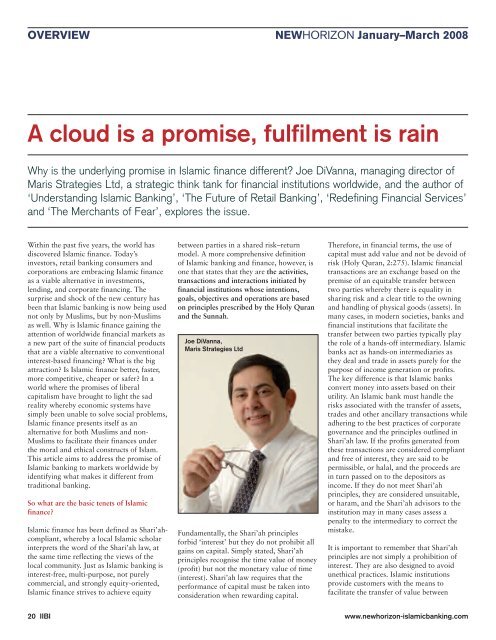BANK KESHAVARZI IRAN
issue no. 167 - Institute of Islamic Banking and Insurance
issue no. 167 - Institute of Islamic Banking and Insurance
- No tags were found...
Create successful ePaper yourself
Turn your PDF publications into a flip-book with our unique Google optimized e-Paper software.
OVERVIEW<br />
NEWHORIZON January–March 2008<br />
A cloud is a promise, fulfilment is rain<br />
Why is the underlying promise in Islamic finance different? Joe DiVanna, managing director of<br />
Maris Strategies Ltd, a strategic think tank for financial institutions worldwide, and the author of<br />
‘Understanding Islamic Banking’, ‘The Future of Retail Banking’, ‘Redefining Financial Services’<br />
and ‘The Merchants of Fear’, explores the issue.<br />
Within the past five years, the world has<br />
discovered Islamic finance. Today’s<br />
investors, retail banking consumers and<br />
corporations are embracing Islamic finance<br />
as a viable alternative in investments,<br />
lending, and corporate financing. The<br />
surprise and shock of the new century has<br />
been that Islamic banking is now being used<br />
not only by Muslims, but by non-Muslims<br />
as well. Why is Islamic finance gaining the<br />
attention of worldwide financial markets as<br />
a new part of the suite of financial products<br />
that are a viable alternative to conventional<br />
interest-based financing? What is the big<br />
attraction? Is Islamic finance better, faster,<br />
more competitive, cheaper or safer? In a<br />
world where the promises of liberal<br />
capitalism have brought to light the sad<br />
reality whereby economic systems have<br />
simply been unable to solve social problems,<br />
Islamic finance presents itself as an<br />
alternative for both Muslims and non-<br />
Muslims to facilitate their finances under<br />
the moral and ethical constructs of Islam.<br />
This article aims to address the promise of<br />
Islamic banking to markets worldwide by<br />
identifying what makes it different from<br />
traditional banking.<br />
So what are the basic tenets of Islamic<br />
finance?<br />
Islamic finance has been defined as Shari’ahcompliant,<br />
whereby a local Islamic scholar<br />
interprets the word of the Shari’ah law, at<br />
the same time reflecting the views of the<br />
local community. Just as Islamic banking is<br />
interest-free, multi-purpose, not purely<br />
commercial, and strongly equity-oriented,<br />
Islamic finance strives to achieve equity<br />
between parties in a shared risk–return<br />
model. A more comprehensive definition<br />
of Islamic banking and finance, however, is<br />
one that states that they are the activities,<br />
transactions and interactions initiated by<br />
financial institutions whose intentions,<br />
goals, objectives and operations are based<br />
on principles prescribed by the Holy Quran<br />
and the Sunnah.<br />
Joe DiVanna,<br />
Maris Strategies Ltd<br />
Fundamentally, the Shari’ah principles<br />
forbid ‘interest’ but they do not prohibit all<br />
gains on capital. Simply stated, Shari’ah<br />
principles recognise the time value of money<br />
(profit) but not the monetary value of time<br />
(interest). Shari’ah law requires that the<br />
performance of capital must be taken into<br />
consideration when rewarding capital.<br />
Therefore, in financial terms, the use of<br />
capital must add value and not be devoid of<br />
risk (Holy Quran, 2:275). Islamic financial<br />
transactions are an exchange based on the<br />
premise of an equitable transfer between<br />
two parties whereby there is equality in<br />
sharing risk and a clear title to the owning<br />
and handling of physical goods (assets). In<br />
many cases, in modern societies, banks and<br />
financial institutions that facilitate the<br />
transfer between two parties typically play<br />
the role of a hands-off intermediary. Islamic<br />
banks act as hands-on intermediaries as<br />
they deal and trade in assets purely for the<br />
purpose of income generation or profits.<br />
The key difference is that Islamic banks<br />
convert money into assets based on their<br />
utility. An Islamic bank must handle the<br />
risks associated with the transfer of assets,<br />
trades and other ancillary transactions while<br />
adhering to the best practices of corporate<br />
governance and the principles outlined in<br />
Shari’ah law. If the profits generated from<br />
these transactions are considered compliant<br />
and free of interest, they are said to be<br />
permissible, or halal, and the proceeds are<br />
in turn passed on to the depositors as<br />
income. If they do not meet Shari’ah<br />
principles, they are considered unsuitable,<br />
or haram, and the Shari’ah advisors to the<br />
institution may in many cases assess a<br />
penalty to the intermediary to correct the<br />
mistake.<br />
It is important to remember that Shari’ah<br />
principles are not simply a prohibition of<br />
interest. They are also designed to avoid<br />
unethical practices. Islamic institutions<br />
provide customers with the means to<br />
facilitate the transfer of value between<br />
20 IIBI www.newhorizon-islamicbanking.com
















